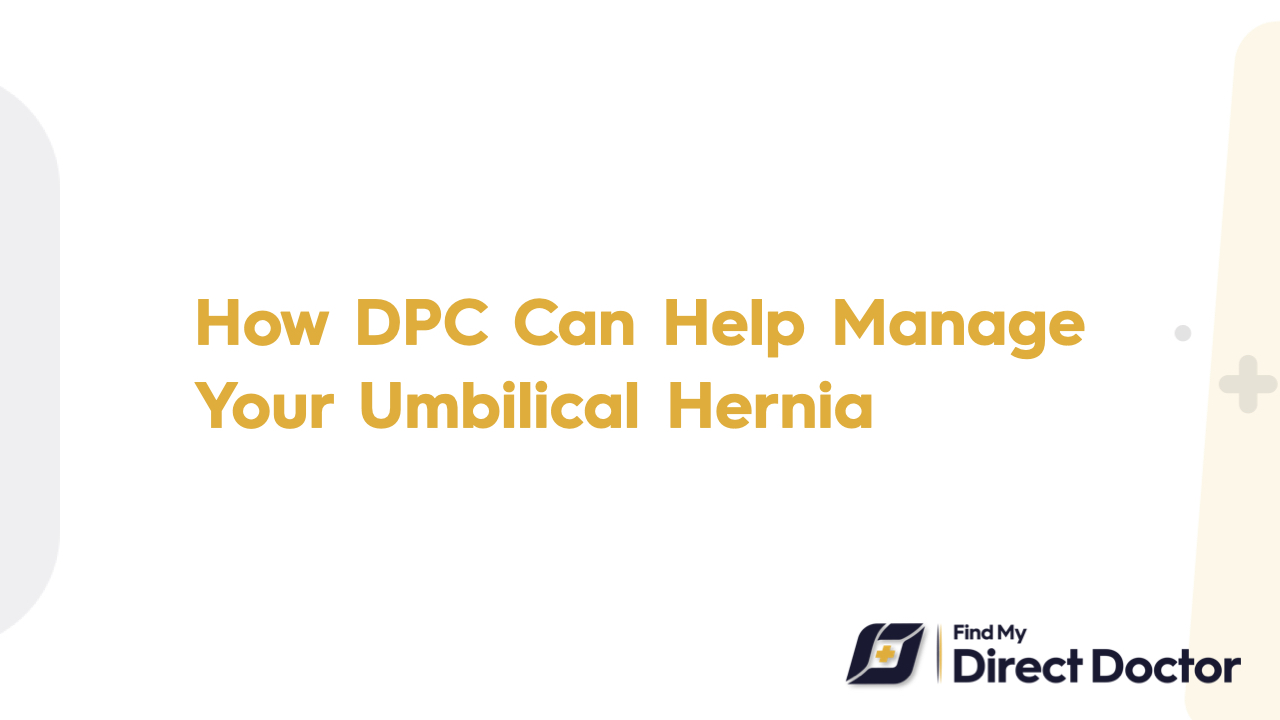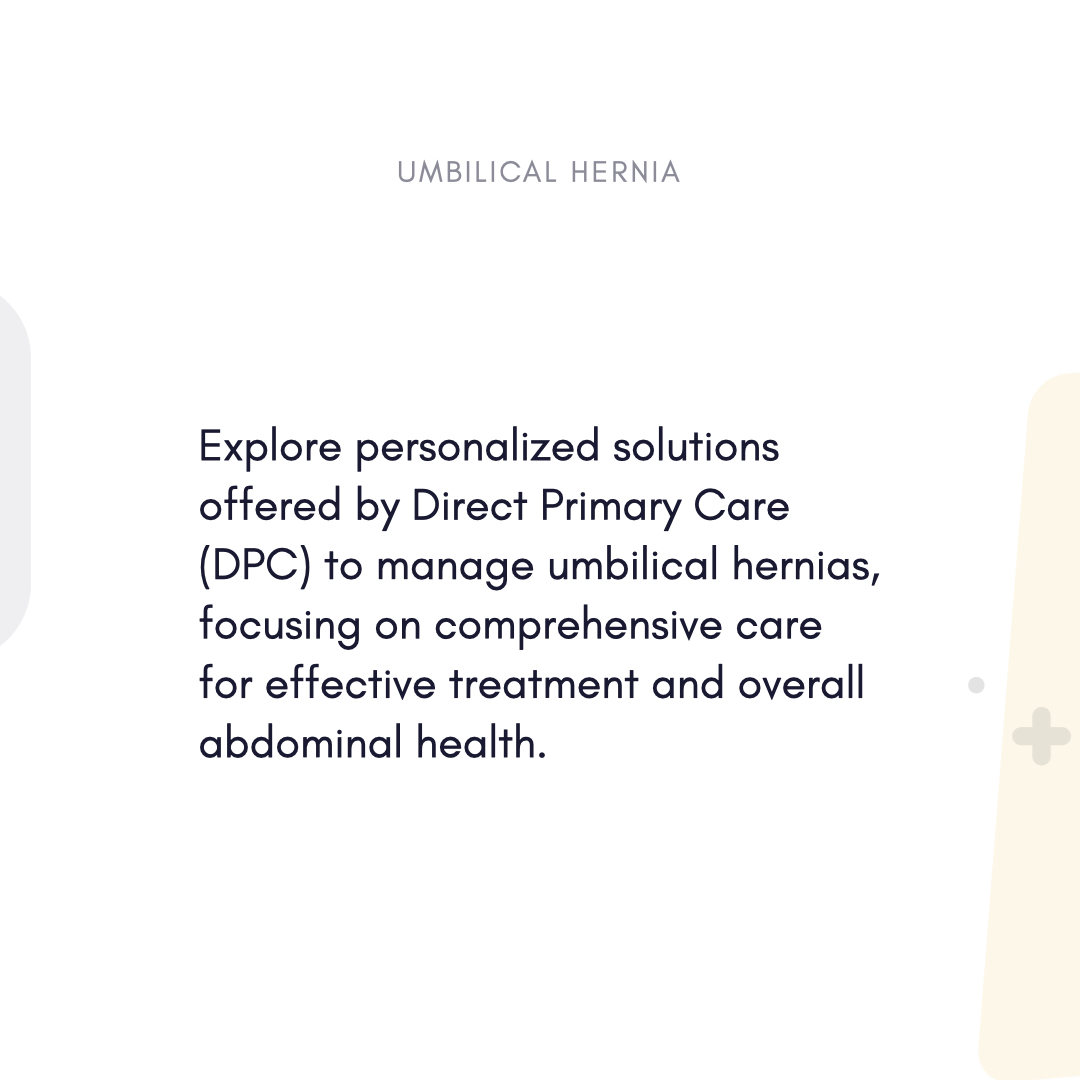Umbilical Hernia and Direct Primary Care (DPC): Proactive Care for a Common Condition
You might have an umbilical hernia if you have felt pain when lifting or seen a soft bulge close to your belly button. Affecting 10–20% of adults, this disorder usually calls for either surgical correction or careful waiting. Direct Primary Care (DPC) presents a patient-centered approach to umbilical hernia management, combining fast diagnosis, affordable monitoring, and seamless surgical coordination.

Knowing Umbilical Hernias and Their Complications
When abdominal tissue rises through a weak point around the navel, an umbilical hernia results. Common in newborns, it can either persist or develop in adults from ascites, pregnancy, or obesity.
- Chronic coughing or heavy lifting.
- Painless bulge that might get bigger under straining.
- Tenderness, redness (if imprisoned).
Complications include:
- Incarceration (trapped tissue).
- Strangulation—loss of blood flow—that calls for emergency surgery.
DPC Improves Umbilical Hernia Treatment
Under the membership model known as Direct Primary Care (DPC), patients pay a monthly fee—usually 50 USD–150 USD—for unlimited access to their main care physician. For hernia patients, this means no surprise bills, no waiting weeks for consults, and treatment emphasizing your comfort and safety.
Here's why DPC distinguishes itself:
1. Timely, Guideline-Driven Assessment
DPC doctors adhere to ACP guidelines including:
- Evaluating reducibility and size in physical exams.
- Referrals for ultrasounds: for hernias of complexity or pain.
- Risk stratification: keeping an eye on high-risk patients—obese smokers.
2. Conservative Management Affordably
- By offering abdominal binders at cost (20 USD instead of 80 USD+) DPC clinics help to lower expenses.
- Providing weight loss, smoking cessation lifestyle coaching.
- Steering clear of ER visits for unexpected pain using 24/7 telehealth.
3. Surgical Follow-Up and Coordination
Should surgery be required, DPC:
- Negotiates cash rates for laparoscopic repair (3,000 USD vs. 15,000 USD+).
- Oversees post-operative wound checks and pre-operative clearance.
- Teaches on stopping recurrence (core strengthening).
DPC Benefits for Patients with Umbilical Hernia
Personalized Monitoring Plans
- Each visit, DPC doctors spend 30 to 60 minutes developing plans including:
- Watchful waiting for asymptomatic hernias.
- Modifying an activity: Steer clear of heavy lifting.
- Dietary guidelines aimed at lowering intra-abdominal pressure help with weight control.
Saving Money
- Not one co-pay for regular physical exams.
- Repair of a hernia at 70–80% less than insured rates.
- Early intervention to prevent emergency surgery.
Holistic Support for Health
DPC tackles:
- Reducing smoking: enhancing surgical results.
- Controlling diabetes means lowering post-operative infection risk.
- Mental health: Concern about surgery or recurrence.
Personal Success Stories from Real Life
- Case 1: Sarah, 35, avoided surgery by DPC-guided weight loss; her hernia healed in eight months.
- Case 2: Using DPC's cash-pay surgical network, John, 50, saved 12,000 USD on elective repairs.
Inquiries: FAQs DPC and the Umbilical Hernia
- Q: Can hernias of the umbilical nature heal without surgery?
- A: In adults, no—but DPC uses conservative management to help delay or avoid surgery.
- Q: Is DPC within high-risk patients' budget?
- A: Agreed. Members save on pre-operative optimization—that is, programs for smoking cessation.
- Q: What happens if my hernia gets choked?
- A: A DPC arranges EMS transportation and quick surgical referrals.
Why DPC Is a Win for Hernia Patients
The American College of Surgeons stresses patient education as a means of avoiding problems. DPC provides this via:
- Early red flag detection is important: discomfort, discoloration, temperature.
- Teaching self-palpation and symptom tracking helps empower patients.
- Cost-cutting simplification: All non-surgical treatment is covered by one monthly cost.
DPC will help you to secure your health.
Umbilical hernias are not cause for concern. Every test, every visit, every step toward resolution—every exam, every consultation—you acquire a partner who watches closely, acts forcefully, and gives your well-being top priority using DPC.






